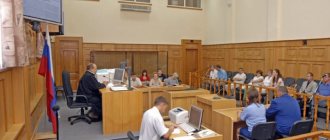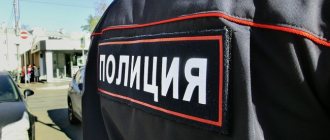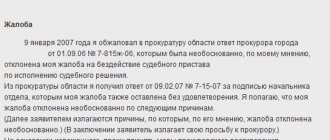Recording the testimony of a witness in the protocol of interrogation of a witness is a procedural action carried out either by the investigative authorities or the court. As part of investigative activities, protocols for the interrogation of witnesses are drawn up on specially designed forms, and as part of judicial proceedings, they are integrated into the general protocol of the court session. Files in .DOC: Form of protocol for interrogation of a witnessSample protocol for interrogation of a witness
Leave a comment on the document
Do you think the document is incorrect? Leave a comment and we will correct the shortcomings. Without a comment, the rating will not be taken into account!
Thank you, your rating has been taken into account. The quality of documents will increase from your activity.
| Here you can leave a comment on the document “Sample. Protocol of interrogation of a witness", as well as ask questions associated with it. If you would like to leave a comment with a rating , then you need to rate the document at the top of the page Reply for |
Questioning a lawyer, concept and evidentiary value
The possibility of a lawyer interviewing citizens when providing legal assistance in a case has been provided for by the current legislation of the Russian Federation since 2002. The establishment in the Code of Criminal Procedure of the Russian Federation, as well as the law “On advocacy and the legal profession in the Russian Federation,” of the possibility of a lawyer collecting evidence laid the foundation for the formation of the institution of “lawyer investigation.” This follows from Part 4 of Article 15 of the Code of Criminal Procedure of the Russian Federation, according to which the parties to the prosecution and defense are equal. Since the prosecution has the right to collect evidence, the defense was given the same right. The right of lawyers to interview persons was granted by the legislator in order to ensure the possibility of proving the circumstances of the case that are within the interests of the principal and, as a consequence, ensuring equality of the parties in the proceedings.
However, not every lawyer, not in every case, uses in his work the opportunity provided by the legislator to interview people. As a rule, this is due to three circumstances. Firstly, either due to the absence of persons who could be interviewed by a lawyer in the case, secondly, due to the lack of consent to interview such persons and, thirdly, due to the fact that many lawyers, and even investigators There are still doubts about the evidentiary value of interviewing witnesses. Nevertheless, practice shows that questioning by a lawyer of persons still has serious evidentiary value when working on a case and over the years is used by lawyers more and more often, especially when working in criminal cases.
In accordance with clause 2, part 3, article 6 of the Law of the Russian Federation “On advocacy and the legal profession in the Russian Federation,” a lawyer has the right to interview persons who allegedly possess information related to the case in which the lawyer provides legal assistance. Also, the right of a lawyer to interview persons with their consent is enshrined in paragraph 2 of part 3 of Art. 86 Code of Criminal Procedure of the Russian Federation (collection of evidence)
Despite the fact that the right of a lawyer to interview persons (witnesses) is provided only in the Code of Criminal Procedure of the Russian Federation, the norms enshrined in the law “On Advocacy and the Legal Profession in the Russian Federation” do not limit the areas of law in which a lawyer has the right to interview persons. A lawyer has the right to interview persons not only in a criminal case, but also in civil, administrative, and arbitration law.
The law does not provide a concept of what an interview of persons by a lawyer is and how it should be carried out. However, from the name of this procedural action it follows that an interview is the work of a lawyer to clarify the circumstances of the case from people who are aware of it or who are direct eyewitnesses of what happened, as well as work to resolve controversial issues in the case. The law does not oblige a lawyer to record everything said by a person during an interview on any storage medium. Thus, a lawyer has the right to interrogate persons both using means of recording the interview, and without recording their testimony on any storage medium. The lawyer has the right to interview persons about the circumstances of the case and independently decide whether to document the person’s answers given during the interview or not.
However, given that the work of a lawyer is aimed at proving the circumstances of the case in the interests of the client, and in accordance with Art. 74 of the Code of Criminal Procedure of the Russian Federation, evidence can be testimonies and other documents, then interviews with persons by lawyers can and should be documented for subsequent submission to the court or investigator (inquirer). Correct and competent recording of a person’s interview will contribute to the effective protection of the interests of the principal in the future. The interview of a person may be documented and may be called an “interview” or “interview protocol.” The Law “On Advocacy and the Legal Profession in the Russian Federation” and the Code of Criminal Procedure of the Russian Federation do not provide lawyers with the opportunity to draw up protocols during the proceedings. Drawing up protocols is the prerogative of persons in authority - investigators, investigators, judges and secretaries. It would be more correct to call such documents a “survey.” However, as practice shows, in many regions the legal community draws up precisely “interrogation protocols,” which is not a violation of the law and gives this legal document some significance and similarity to documents drawn up by investigators and interrogators during the proceedings.
In practice, the question of the need for a lawyer to warn the person being interviewed about criminal liability for giving false testimony remains controversial. Judging by the provisions of the law regulating the conduct of interviews, a lawyer is not obliged to warn the person he is interviewing about criminal liability for giving false testimony. However, taking into account the fact that persons questioned by a lawyer, as a rule, are questioned later by an investigator or court, it would not be superfluous to warn the person being questioned about responsibility and offer to give only truthful testimony.
Also controversial is the question of whether a lawyer can interview a person who has previously been questioned in the case by the investigator or the court. According to the law, a lawyer has the right to interview a person even after he has been questioned by an investigator or court. The law does not contain any prohibition on interviewing a person after his interrogation by an investigator. A witness in a case may be questioned by the court or investigator incompletely, and the witness may recall some circumstances of the case after questioning, and in this case, an interview with such a witness by a lawyer may be extremely necessary.
Until now, many investigative workers often do not recognize or do not want to recognize attorney interviews with individuals as evidence in the case. The same situation may arise in the courts. However, according to clause 2, part 1, art. 53 of the Code of Criminal Procedure of the Russian Federation (powers of a defense attorney), a lawyer has the right to: “collect and present evidence...”. Part 3 of Article 86 of the Code of Criminal Procedure of the Russian Federation also states that: “The defense attorney has the right to collect evidence” and paragraph 2 of this part of the article stipulates that the defense attorney has the right to collect evidence by interviewing persons with their consent. An analysis of these norms leaves no doubt about the evidentiary value of interviews with persons conducted by a lawyer. An interview of a person conducted by a lawyer and documented in writing is criminal procedural evidence.
Thus, the lawyer's questioning must be assessed by the inquirer, investigator, prosecutor, court in accordance with Art. 87 Code of Criminal Procedure of the Russian Federation. The lawyer's interview must be assessed by the authorities by comparison with all other evidence in a criminal or civil case, regardless of whether the person interviewed by the lawyer will subsequently be summoned for questioning by the investigator or in court. The law does not oblige the investigator to interrogate the persons interviewed by the lawyer, however, the investigator and the court have the right to do this in order to objectively and comprehensively clarify all the circumstances of the case.
In civil proceedings, a lawyer's interview is also evidence, since in accordance with Art. 55 of the Code of Civil Procedure of the Russian Federation, evidence is information about the facts substantiating the claims of the parties, and this information can be obtained from the explanations of witnesses, written evidence, which can include a lawyer’s interview. Undoubtedly, the legislator paid more attention to the evidentiary value of a lawyer's questioning in criminal proceedings than in other areas of law, but a lawyer's questioning, as stated above, can be evidence in a civil, administrative, arbitration case and serves as the main tool for proving the interests of the client by a lawyer. You can download a sample lawyer survey
.
You can seek legal assistance and legal advice from lawyer Sibalakov Alexey Gennadievich by phone 89276103047
advokat-tolyatti.ru
Found documents on the topic “sample protocol for interrogating a witness”
- Sample . Protocol of interrogation of a witness Documents of the enterprise's office work → Sample.
Protocol of the interrogation of a witness Protocol of the interrogation of a witness date, month, year in words, city of the region (republic). I, (last name, first name, patronymic), state note... - Sample. Short form protocol
Enterprise records management documents → Sample. Brief protocol formform of a short protocol name of the enterprise protocol "" 20 no. production meeting chairman - se...
- Sample. Form protocol
Enterprise records management documents → Sample. Protocol formprotocol form name of enterprise protocol "" 20 no. chairman - secretary - presence...
- Sample. Protocol board meetings on providing a legal address
Enterprise records management documents → Sample. Minutes of the board meeting on providing a legal addressminutes of the board meeting on the provision of a legal address minutes no. from "" 20th board meeting (half...
- Sample. Protocol meetings of the commission on liquidation of a joint-stock company
Founding agreements, charters → Sample. Minutes of the meeting of the commission for liquidation of the joint-stock companyprotocol no. meeting of the commission for liquidation of (open/closed) joint stock company (name) "" 20 ...
- Sample. Protocol on approval of the act of the liquidation commission
Founding agreements, charters → Sample. Protocol on approval of the act of the liquidation commissionminutes n of the meeting of the commission for liquidation of the joint-stock company * (open/closed) (name) "" 20 present...
- Sample. Extract from protocol general meeting of shareholders on changes to the charter of the joint stock company
Enterprise records management documents → Sample. Extract from the minutes of the general meeting of shareholders on changes to the charter of the joint-stock companyfrom the minutes of the general meeting of shareholders (full name of the joint-stock company) agenda: 1. on changing the charter of the joint-stock company. on item 1 spoke...
- Sample. Protocol constituent meeting of a non-profit public organization
Founding agreements, charters → Sample. Minutes of the founding meeting of a non-profit public organizationminutes of the constituent meeting of a non-profit public organization protocol of the constituent meeting of a non-profit...
- Sample protocol general meeting of employees
Enterprise records management documents → Sample minutes of a general meeting of employeesLimited Liability Company "Baromir" Minutes No. of the general meeting of employees of the city "" 20 total employees of the organization - people...
- Sample protocol staff meetings
Documents of the enterprise's office work → Sample minutes of a meeting of the labor collectiveMinutes No. of the general meeting of employees of the city "" 20 years of payroll: people. staff: people...
- Sample. Protocol n1 meetings of limited liability company participants
Founding agreements, charters → Sample. Minutes n1 of the meeting of limited liability company participantssample protocol n 1 of the meeting of participants of a limited liability company “name of company” Moscow “” 1995. ...
- Sample. Protocol No. 1 meeting of shareholders of a closed joint stock company
Founding agreements, charters → Sample. Minutes No. 1 of the meeting of shareholders of a closed joint stock companysample protocol n 1 of the meeting of shareholders of a closed joint-stock company “name of the company” Moscow “” 1995. present...
- Sample. Protocol No. 1 meeting of shareholders of a closed joint stock company
Founding agreements, charters → Sample. Minutes No. 1 of the meeting of shareholders of a closed joint stock companysample protocol n 1 of the meeting of shareholders of a closed joint-stock company “name of the company” Moscow “” 1995. present...
- Sample. Protocol meeting of the founders of a non-profit humanitarian foundation
Founding agreements, charters → Sample. Minutes of the meeting of the founders of the non-profit humanitarian fundminutes of the meeting of the founders of a non-profit humanitarian fund minutes of the meeting of the founders of a non-profit organization...
- Sample. Protocol meeting of the founders of a non-profit humanitarian foundation
Founding agreements, charters → Sample. Minutes of the meeting of the founders of the non-profit humanitarian fundMINUTES of the meeting of the founders of the non-profit organization humanitarian fund "" 20 " Present
Interrogation of witnesses, investigators and operational officers in court
From the analysis of Part 1 of Article 74 of the Code of Criminal Procedure of the Russian Federation, it follows that in relation to the case under consideration, evidence can be divided into several types, including:
1) evidence of the commission (non-commission) of the accused act by the defendant and his guilt (innocence) therein;
2) evidence of the legality (illegality) of the ongoing investigative actions and operational investigations.
In addition, in Chap. 8 of the Code of Criminal Procedure of the Russian Federation, independent participants are indicated as “other participants in criminal proceedings” - a witness and a witness.
The testimony of witnesses and the investigator are not included in the list of evidence given in Part 2 of Art. 74 Code of Criminal Procedure of the Russian Federation.
Hence, the evidence of a person’s guilt (innocence) in the incriminated act is the protocols of investigative actions and the operational investigation, and it is on their basis that the court must draw appropriate conclusions.
What to do if a party (prosecution or defense) files a motion to interrogate the above-mentioned persons as witnesses (even if a motion to inadmissible evidence was not filed)?
Apparently, the court has the right to satisfy this petition with reference to Part 8 of Article 234 of the Code of Criminal Procedure of the Russian Federation. At the same time, the testimony of witnesses, operational officers, investigators interrogated in accordance with Part 8 of Art.
234 of the Code of Criminal Procedure of the Russian Federation, can have evidentiary value only when assessing the admissibility of evidence - protocols of investigative actions and operational investigations (as “other documents”), on the circumstances of their production, but cannot be used as independent evidence of the guilt of the defendants, including on the basis of procedural status of witnesses and investigator.
The interrogation of these persons as “witnesses” does not change their basic procedural status. As noted by the Constitutional Court of the Russian Federation, Art. 56 of the Code of Criminal Procedure of the Russian Federation determines only the legal status of a witness in criminal proceedings, but not the substance of his testimony as evidence in a criminal case.
The inadmissibility of using the above evidence as evidence of the guilt of the defendants is confirmed by judicial practice.
The concept of evidence, the rules for evaluating and verifying evidence are the same for the consideration of cases both in the general procedure and with the participation of jurors.
Issues of a procedural nature in accordance with Part 5 of Art. 335 of the Code of Criminal Procedure of the Russian Federation, including those relating to the admissibility and inadmissibility of evidence, are the exclusive competence of the presiding judge and are discussed only in the absence of jurors.
It is when deciding on the admissibility of evidence, before presenting evidence to the jury, in accordance with Part 8 of Art. 234 of the Code of Criminal Procedure of the Russian Federation, witnesses, operational officers, investigators, etc. can be questioned as witnesses.
Discussion of these issues in the presence of jurors is grounds for overturning the verdict. (definition of the Investigative Committee for Criminal Cases of the Armed Forces of the Russian Federation in case No. 73-o04-27sp).
If the evidence is accepted, admissible jurors are presented with the investigative report, the confession, or the ORM report.
If the evidence is declared inadmissible, the testimony of the above-mentioned witnesses, operational officers or investigators is not presented to the jury, that is, the evidence is “either there or it is not”, replacement or substitution of evidence does not occur.
At the same time, in a parting word (very similar to the descriptive and motivational part of the verdict when considering a case in the general order), the presiding officer also does not have the right to refer to the testimony of witnesses, operational officers, investigators, but cites only “primary sources” - protocols of the operational investigation, confession, investigative actions, etc. (determination of the RF Armed Forces dated October 24, 2008 No. 41-008-76sp).
From the above, we can conclude that, when checking evidence (if necessary or at the request of the parties), witnesses, operational officers, and an investigator can be questioned. In this case, these persons are interrogated as witnesses to the investigative action or operational investigation.
Investigative Committee for Criminal Cases of the Armed Forces of the Russian Federation in case No. 73-o04-27sp).
If the evidence is accepted, admissible jurors are presented with the investigative report, the confession, or the ORM report.
If the evidence is declared inadmissible, the testimony of the above-mentioned witnesses, operational officers or investigators is not presented to the jury, that is, the evidence is “either there or it is not”, replacement or substitution of evidence does not occur.
At the same time, in a parting word (very similar to the descriptive and motivational part of the verdict when considering a case in the general order), the presiding officer also does not have the right to refer to the testimony of witnesses, operational officers, investigators, but cites only “primary sources” - protocols of the operational investigation, confession, investigative actions, etc.
Interrogation procedure
The possibility of calling and questioning new witnesses at a court hearing, including investigators and interrogators who were in charge of the case, is provided for in Part 8 of Art. 234 and art. 271 Code of Criminal Procedure of the Russian Federation.
A witness is a person who may be aware of any circumstances relevant to the investigation and resolution of a criminal case, and who is called to testify.
lawyer, defender of a suspect, accused - about the circumstances that became known to him in connection with an appeal to him for legal assistance or in connection with its provision;
judge, juror - about the circumstances of the criminal case that became known to them in connection with participation in the proceedings in this criminal case; 7) petition for the application of security measures provided for in Part 3 of Article 11 of the Code of Criminal Procedure of the Russian Federation.
On the other hand, there are situations when, due to objective reasons, the investigator has no choice but to resort to interrogation of the same operational worker.
For example, when the person from whom the operational worker seized the item is absent (died, left, location unknown, etc.).
Interrogation of an official in this case is necessary, since only this action can procedurally “link the seized item and the circumstances of the criminal case. Interrogation of an official (investigator, investigator, operational officer, district commissioner, etc.
) in order to obtain (replenish) evidence in a criminal case. During the investigation of a criminal case, the following situation often occurs.
During the preliminary investigation, an operative officer confiscates from a person an item of significance in a criminal case, documenting such an action with a report or a corresponding act.
A further mechanism for the status legalization of a seized item is the execution by the investigator of a number of investigative actions, including the seizure of the specified- The reason for the appeal was that in the conviction against the applicant, left unchanged by higher courts, there are references to the testimony of police officers.
They were questioned as witnesses about the circumstances of the detention of the person who reported the crimes committed, the criminal case against whom was terminated due to death.
The expert noted that the problem was clearly outlined in the complaint: the evidence used as the basis for the verdict was the testimony of law enforcement officers who talked with another suspect and testified about the results of the conversation. “From the point of view of the theory of criminal proceedings, such evidence should be declared inadmissible. However, we see that this does not happen.
Can the suspect's lawyer somehow challenge our testimony at trial?
V.V. Kalnitsky and O.I. Beketov (Omsk Higher School of the Ministry of Internal Affairs of the Russian Federation) about the persons in the courtroom.
- upon the death of a witness or a serious illness that prevents him from appearing in court (this means an illness of such severity that even an on-site court hearing is inappropriate and can harm a person’s health);
If both parties to criminal proceedings agree to the disclosure of the testimony of a witness that he gave during the investigation, the court may decide on the disclosure, regardless of the presence of one of the above grounds.
Let's say you are a witness in a criminal case. Here are some practical tips on how to behave during interrogation in court:
- First, don't ignore the challenge. It will not be very pleasant when there is a knock on your door at 7 am - bailiffs try to bypass the addresses indicated in the arrest order as early as possible. It is your civic duty to appear and testify.
- It happens that the proceedings are postponed without starting (for example, representatives of one of the parties fall ill). Then you need to find out from the assistant judge the date of the next court hearing and receive a summons.
- Usually the person being called knows in advance under what circumstances they want to interrogate him. Try to remember well the events related to the crime in order to answer the questions posed as accurately as possible. There is no need to invent or assume if you do not remember this or that detail. It’s better to answer honestly: “I don’t remember.”
- Give your testimony confidently and clearly, provide only information that is relevant to the case. Do not focus on biographical information that is not related to the events of the crime.
- Remember that the witness does not have the right to ask questions to the participants in the process and the court. At the same time, he has the right to submit requests of various nature related to the procedural order (for example, a request for a break due to poor health, a statement about pressure exerted on him by other persons, a request for payment of expenses, etc. ).
The interrogation procedure in civil cases largely coincides with criminal proceedings, but there are still some differences:
- Only those persons declared by the parties are summoned to the court hearing to resolve disputes: there is no list that is drawn up before the court hearing and is mandatory for the judge.
- In civil proceedings, there is no obligation for the judge to question a witness who has appeared. If the court considers the request for questioning to be unmotivated, it may refuse to satisfy it, even if an eyewitness to the controversial events is already outside the courtroom.
- In civil cases, written testimony of witnesses cannot be accepted as evidence, unlike in criminal proceedings, where interrogation protocols given at the pre-trial stage are widely used. At the same time, in some cases, the court, when considering a civil case, can do without repeated interrogation and read out the testimony of the person given earlier in the same court hearing. Example No. 2 . When considering a claim for debt collection, an employee of the Management Company was called, who brought to the attention of the participants a detailed calculation of the debt for housing and communal services. The case was postponed due to the busyness of the defendant's representative. The CC officer was unable to appear at the next court hearing. Since the parties did not have any new questions for him, it was decided to read out the testimony he gave at the previous meeting.
- In civil proceedings, a form of interrogation by writ is permissible - the procedure will be carried out by the judge of the city where the person lives, after which the original protocol will be sent to the court where the case is being considered on the merits. In criminal proceedings, this form of providing evidence is not provided.
- In civil proceedings, interrogation of “classified” witnesses is not practiced; video conferencing is extremely rarely used. In addition, a decree on summons is rarely issued: in the consideration of disputes, the principle of adversarialism is more pronounced than in criminal proceedings; Ensuring attendance is almost entirely the responsibility of the parties, and the court's participation in the delivery of witnesses is minimal.
Sources
- Karimzhan Shakirov Forensic expertology: problems and solutions (from theory to practice); Lights - Moscow, 2016. - 263 p.
- Alexander Ivanovich Stakhov Administrative control and supervisory proceedings; Mir - Moscow, 1999. - 471 p.
- Alexander Anatolyevich Mokhov Russian business law in tests. Tutorial; Prospect - M., 1988. - 453 p.
- Dudin Alexey Accounts receivable. Refund methods that work; IL - Moscow, 2012. - 411 p.
- Zlata Anatolyevna Pochezhertseva Legal regulation of the Russian securities market: private law and public law principles. Monograph; Prospect - M., 2011. - 251 p.
Related documents
- Sample. Minutes of the board meeting on providing a legal address
- Sample. Register of acceptance and delivery of documents. Form No. m-13
- Sample. Information on the composition of the enterprise's (organization's) labor costs. Form No. 1 (labor force) (Resolution of the State Statistics Committee of the Russian Federation dated November 27, 1995 No. 189)
- Sample. List of employees who (will) be entrusted with carrying out operations related to foreign economic activity (letter of the Central Bank of the Russian Federation dated April 15, 1996 No. 275)
- Sample. Structural and staffing numbers
- Sample. Certificate
- Sample. Form for maintaining a register of business entities that have a market share of a certain product of more than 35 percent (Order of the State Committee for Administrative Offenses of the Russian Federation dated March 15, 1996 No. 29)
- Sample. Brief protocol form
- Sample. Protocol form
- Sample. Staffing table of the enterprise
- Sample. Change of the authorized capital
- Regulations on the procedure for paying dividends on shares and interest on bonds (standard form)
- Regulations on the procedure for the acquisition and redemption of issued shares by a joint-stock company (standard form)
- Regulations on deposits
- Sample minutes of the general meeting (meeting of authorized representatives) of the collective farm (state farm) labor collective (appendix to the regulations on the commission for land privatization and reorganization of the collective farm (state farm), approved by the Ministry of Agriculture on January 22, 1992)
- Sample minutes of a general meeting of the labor collective
- Minutes of the collective farm board meeting
- Minutes of the general meeting (meeting of authorized representatives) of the collective farm (state farm) labor collective (appendix to the regulations on the commission for land privatization and reorganization of the collective farm (state farm), approved by the Ministry of Agriculture of the Russian Federation on January 22, 1992)
- Minutes of the general meeting of a peasant (farm) farm on the procedure for labor relations in a peasant (farm) farm
- Register of documents confirming expenses incurred (attachment to the declaration of total annual income)
Types of witnesses
A witness is a person who may have information relevant to the case under investigation. Based on the type of information, interrogated persons are divided into:
- Eyewitnesses who directly observed the commission of a crime.
- Witnesses who have information that will help solve the case and relate to:
- criminal;
- weapons of crime;
- eyewitnesses;
- other circumstances.
Regarding participation in the incident, two groups of witnesses can be distinguished:
- Active ones who participated in the situation. For example, they tried to prevent an unlawful act, provided assistance in apprehending the criminal, and rescuing the victims.
- Passive, not interfering in the course of events:
- Due to one’s own indecision, fear of danger, at the request of loved ones.
- For lack of such an opportunity. For example, the incident was seen from the window of an apartment or a passing vehicle.







